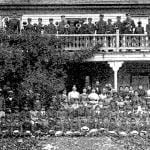
The main occupation of the Eastern Band of Cherokees of North Carolina is that of farming. The acreage is very limited in each tract, but crops more than sufficient for home necessities are generally realized. Seed sowing is mainly done by hand, because the use of machinery is impracticable on their hillside farms. Hand sowing is also practiced among the white people upon adjoining lands, and the growing crops indicate very sparse and unequal spread of the seed. The mountain soil and occasional sand levels need a fertilizer in order to replace the waste of annual tillage, but the steep declivities, where patience has secured a good planting, are often swept by storm torrents, so that fertilizers retain only a slight hold. It is impossible to visit the different sections without the conviction that the people of both sexes, children included, are domestic and industrious. With the exception of blacksmithing, some cobbling, and plain harness work, mechanical trades have few followers. The men are expert with the ax, however, hewing out thick planks for wagon beds, and the timber of the blockhouses is well shaped and well fitted. Ingenuity and skill are exhibited in pottery, but as a business it has ceased to be profitable. Plain ironwork is done by a few, and Sololah makes a good knife, with well-tempered blades, Davis Welch, a wagon maker, runs his forge bellows by convenient water power. Wooden spoons, both beautiful and useful, are made from the laurel, and there are those who can manufacture “ancient relies” as well as white men, and can at short notice produce the “genuine old furniture of colonial times”. Baskets are also made from oak splints and the cane for household and farm uses, but this is no longer followed as a general industry. The material for an expansive industrial development of this people is at hand.
Already, by their contact with the progressive civilization which is reconstructing society and all external home surroundings, they are hinting that frame houses with glass windows are better fitted for home comforts than those now in use; but the cost of lumber and hauling is an obstacle to the construction of this class of houses, for little returns in money come from the small farm surplus. The oak, pine, holly, laurel, walnut, chestnut, sourwood, service, mulberry, hemlock, spruce, and sassafras woods cost practically only the felling and hauling, and the supply, which is abundant, will continue for years. A single sawmill established near the government agency would soon revolutionize the building system and bring cash returns, which could be used in the cultivation of the freshly cleared lands. Trespassers have already commenced systematic robbery, and the federal courts are handling the offenders. The whole system of hitherto crude bridge making will be changed when heavy lumber is within reach, and ready communication, almost wholly suspended during several months by high waters, will break up the isolation of many farmers and stimulate the entire people to a higher plane of living. Access to schools and to neighboring markets will be quickened in proportion as the secluded trails for the foot traveler or single steer give place to good roads, which are only possible in that mountain region when bridges, well built above high-water mark, become frequent. Suitable clay for the manufacture of brick is accessible, as well as kaolin, which is rapidly making the village of Dillsboro a beautiful and flourishing commercial center.
